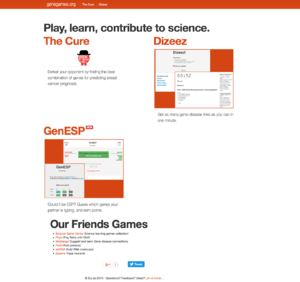Difference between revisions of "Gene games"
| Line 13: | Line 13: | ||
== <small>'''Description'''</small> == | == <small>'''Description'''</small> == | ||
| − | + | Gene Games is a gaming platform contributing to the development of smarter disease prediction programs. The platform is owned by the Su Lab, a group working in the field of bioinformatics, applying computer science tools and statistics to promote biological discovery. In addition to providing an entertaining and educational platform, the project posits that by making biological knowledge accessible to gamers, these same learning algorithms can help develop better prediction models. | |
| − | + | The project has explored and developed several experimental games, such as: The Cure, Dizeez and GenESP, the Science Game Center (science learning game collection), Phylo (play Tetris with DNA), Mobianga! (suggest and learn gene-disease connections), Foldit (fold proteins), eteRNA (build RNA molecules) and Eyewire (trace neurons). The Cure is a biology based card game where you can learn the laws of nature to predict genetic patterns. The game was shown at the 2012 Genome Informatics by Andrew Su. 120 gamers signed up and activated 2000 games. The Cure is currently working on creating the best predictor for breast cancer by looking for players interested in learning and contributing to the development of a better tool by playing the game. Dizeez is a game looking for gene-disease links. Diseases are classified by area: cancer, metabolism, immunology, and mental health, as well as by protein family. Finally, the GenESP game has two players look into the same disease and guess which gene their partner is typing. | |
== <small>'''Interview'''</small> == | == <small>'''Interview'''</small> == | ||
Latest revision as of 00:25, 3 June 2017
Contents
Self-portrait
Play, learn, contribute to science.
The Cure Defeat your opponent by finding the best combination of genes for predicting breast cancer prognosis.
Dizeez Get as many gene-disease links as you can in one minute.
Description
Gene Games is a gaming platform contributing to the development of smarter disease prediction programs. The platform is owned by the Su Lab, a group working in the field of bioinformatics, applying computer science tools and statistics to promote biological discovery. In addition to providing an entertaining and educational platform, the project posits that by making biological knowledge accessible to gamers, these same learning algorithms can help develop better prediction models.
The project has explored and developed several experimental games, such as: The Cure, Dizeez and GenESP, the Science Game Center (science learning game collection), Phylo (play Tetris with DNA), Mobianga! (suggest and learn gene-disease connections), Foldit (fold proteins), eteRNA (build RNA molecules) and Eyewire (trace neurons). The Cure is a biology based card game where you can learn the laws of nature to predict genetic patterns. The game was shown at the 2012 Genome Informatics by Andrew Su. 120 gamers signed up and activated 2000 games. The Cure is currently working on creating the best predictor for breast cancer by looking for players interested in learning and contributing to the development of a better tool by playing the game. Dizeez is a game looking for gene-disease links. Diseases are classified by area: cancer, metabolism, immunology, and mental health, as well as by protein family. Finally, the GenESP game has two players look into the same disease and guess which gene their partner is typing.
Interview
Benjamin Good http://dpya.org/en/index.php/Benjamin_Good
Links
URL: http://genegames.org/games/
Wayback Machine: https://web.archive.org/web/*/http://genegames.org/games/
